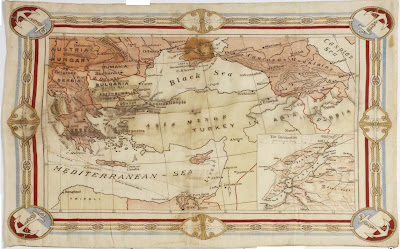November 24, 2010
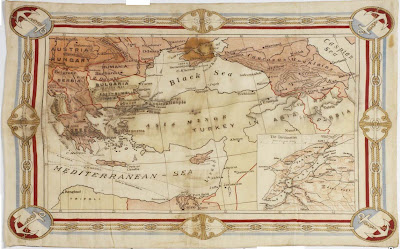 Cloth ‘map’ produced by the Guardian as a souvenir of the Dardanelles campaign. (click to enlarge)
Cloth ‘map’ produced by the Guardian as a souvenir of the Dardanelles campaign. (click to enlarge)Mavi Boncuk |
The Dardanelles has been of great strategic significance for centuries; a narrow 60-mile-long strip of water that runs from the eastern Mediterranean into the Sea of Marmara, it divides Europe from Asia. Carefully secured by international treaty, it was the closing of the Dardanelles that eventually brought the Ottoman Empire into the war as a German ally at the end of October 1914.
Instructions issued to General Sir Ian Hamilton, as commander of military operations at the Dardanelles, by the Secretary of State for War, Field Marshal Lord Kitchener. At Hamilton’s request, the title of the Expeditionary Force was changed to ‘Mediterranean’ from ‘Constantinople’. Although capital of the Ottoman Empire since 1453 and known to the Ottomans as Istanbul, the city remained known in the West by its earlier Christian name of ‘Constantinople’ until the twentieth century.
November 23, 2010
Herbert Hillier in Gallipoli
BONUS: The most popular map download from Mavi Boncuk Archives. A 1915 Gallipoli map printed by the Turkish War Ministry |
British War Artist Herbert Hillier’s Sketch of may 17, 1915 Salvos from a british ship pound Turkish positions in Gallipoli.
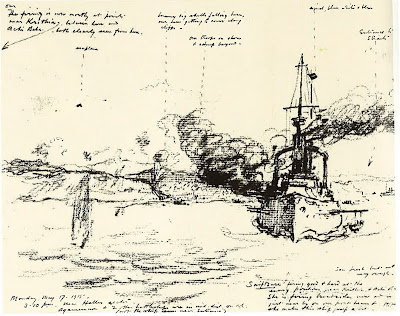 Australian War Memorial holds the collection relating to the service of Mr. Herbert Hillier, Royal Navy, Gallipoli, Imbros. Collection consists of typescript copy of a diary kept by Hillier, a British artist, who served in the balloon ship ‘Manica’ [1] off the Anzac position. The diary consists chiefly of notes intended to accompany his sketches made during the Gallipoli campaign. These sketches are held in the Imperial War Museum, London.
Australian War Memorial holds the collection relating to the service of Mr. Herbert Hillier, Royal Navy, Gallipoli, Imbros. Collection consists of typescript copy of a diary kept by Hillier, a British artist, who served in the balloon ship ‘Manica’ [1] off the Anzac position. The diary consists chiefly of notes intended to accompany his sketches made during the Gallipoli campaign. These sketches are held in the Imperial War Museum, London.
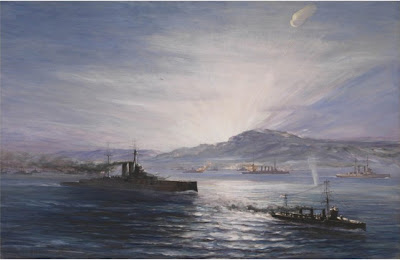 The Dawn of Anzac Day, Sunday 25th April 1915, by Herbert Hillier. The Australian and New Zealand Army Corps (ANZAC) undertook one of the two major landings of the campaign. 25 April – Anzac Day – is now a day of great significance in both countries, on which the values enshrined in the event are remembered. However, it is also important to remember that the British 29th Division landed on 25 April and suffered comparable casualties.
The Dawn of Anzac Day, Sunday 25th April 1915, by Herbert Hillier. The Australian and New Zealand Army Corps (ANZAC) undertook one of the two major landings of the campaign. 25 April – Anzac Day – is now a day of great significance in both countries, on which the values enshrined in the event are remembered. However, it is also important to remember that the British 29th Division landed on 25 April and suffered comparable casualties.
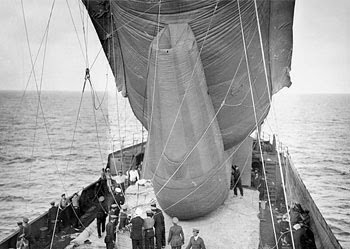
[1] March 11, 1915-The Royal Navy charters the cargo ship SS Manica for conversion into the first British balloon ship, HMS Manica. The Royal Navt will be the only navy during World War I to operate balloon ships, specialized ships designed to handle observation balloons as their sole function. April 19, 1915-During the Gallipoli campaign, the Royal Navy balloon ship Manica lofts her observation balloon operationally for the first time in the first operational use of a balloon ship during World War I. The observer in her balloon directs fire against Ottoman positions for the armored cruiser Bacchante[*]. Manica’s work during the campaign impresses the British Admiralty for it to order additional balloon ships.
Photo: A ‘Drachen’ type balloon is held steady aboard the SS MANICA, while its observer waits to climb into the basket, off the Gallipoli coast, summer 1915.
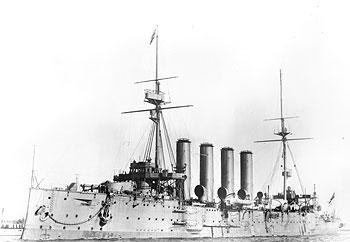
[*]HMS Bacchante was a Cressy-class armoured cruiser launched in 1901 for the Royal Navy. Bacchante served for a while with the Mediterranean Fleet. In 1906 she was transferred to the North America and West Indies Squadron and served there until she returned to home waters. At the outbreak of the First World War, Baccante served as the flagship of the Live Bait Squadron, blockading the English Channel from the North Sea to German traffic. Bacchante took part in the landing at Anzac Cove during the Battle of Gallipoli in 1915. When the infantry came under fire from Turkish artillery at Gaba Tepe, Bacchante approached close in to shore and fired directly on the gun emplacements in an attempt to silence them.
